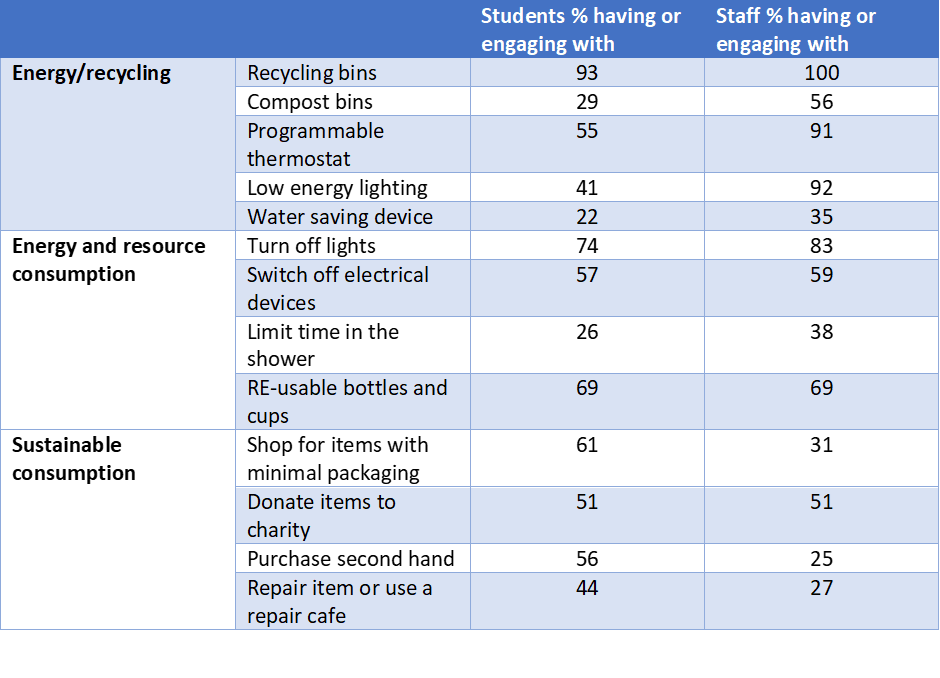In 2023 the surveys with students and staff were repeated. Response rates were very low for students n=281 and n=380 for staff. The extremely low student response rate may be a post-Covid symptom.
Sustainability awareness and behaviours amongst staff and students have changed in 2023 compared to previous years. With 87% of students declaring they are very or somewhat committed to sustainability an increase of 7% from 2021-22. For staff asked the same question this has decreased to 96% from 98% in the previous survey. Longitudinal surveys from SOS UK show that since 2010, around 80 per cent of students have declared that they want their institutions to be doing more on sustainability, and around 60 per cent want to learn more about it.
In 2021-22 the university surveyed students and staff about sustainability awareness and behaviours as part of a longitudinal study going back several years through which can monitor trends. Here we take a look at a few key points from the latest data.
We were pleased to find that students and staff remain overwhelmingly committed to sustainability with over 80% of students and 98% of staff responding saying they were committed. Pleasingly, broad awareness of the university’s sustainability measures has remained good. However, there have been drops in awareness in some areas and the Covid-19 pandemic has continued to have an impact on our student and staff body and our sustainability behaviours.
Sustainability awareness amongst students and staff

As shown in the table above, amongst students and staff there was continuing good awareness of efforts to promote the Sustainable Development Goals in the curriculum and the wider work of the university and the student’s union. There was also increasing awareness amongst staff and students of efforts to reduce carbon. Staff also showed increasing awareness of the university’s efforts to increase biodiversity on campus. There was a slight drop in student and staff awareness of some of the university’s other sustainability measures, such as energy conservation and biodiversity (students) and promoting public transport, cycling and car share (staff and students). This perhaps reflects continued change in time spent on-campus and engagement with online campaigns and promotions, resulting from continuing post-Covid impacts. There is clearly some further work to do here in terms of how to best develops and targets sustainability campaigns and engagement activities in the future.
Sustainability behaviours amongst students and staff

As shown in the table above, the ways in which students and staff engage in sustainability behaviours varies. In terms of household recycling and energy efficiency measures, results were similar to last years for staff, although showed some variation for students as more moved back to be in halls and shared accommodation compared to last year. For both, recycling bins were unsurprisingly the most common listed item, but compost bins less so. Fewer students had programmable thermostats, low energy compact fluorescent light bulbs/LED light bulbs or water saving devices, reflecting the differences between private homes and shared student off-campus accommodation where some of these items are less commonly provided.
In terms of sustainability behaviours in energy and resource consumption, in comparison to last years’ survey there were both similarities and differences in student and staff responses. For students and staff, the percentage turning off lights and electrical devices remained similar, but the proportion limiting time in the shower or always using a reusable water bottle or coffee cup decreased, which reflects some changes in behaviour post-Covid in time spent at home and in reusable use in cafes, etc.
Looking at sustainable consumption practices, in comparison to last year, a lower proportion of students said they either sometimes or always engaged in these practices, although in all cases the proportion reducing packaging, shopping second-hand or repairing items was higher than for staff. Students also reported donating less frequently to charity, although the proportion doing so was similar to that for staff who increased the frequency of donations from that reported in the previous year. These changes again perhaps reflect the impact of Covid-19 restrictions on behaviours and habits, and campaigning around these issues, and it is clear this has had an impact in checking the recent upward trend in the development of sustainable consumption practices.
Overall, it is fair to say that the work across the university and student’s union to increase knowledge and awareness of sustainability is paying off, although their remain challenges to address from the impact of the pandemic to ensure that we can raise awareness further and promote behaviour change in the longer-term.
We can be proud of the progress we have made to date and aim for even more growth for the future.
If you are interested in reading the full report, please see the link below.